|
WAIL! The
CyberBoxingZone Journal
September 2000 issue |
|
 |
|
Preview
of the 2000 Olympic Team
|
By Adam Pollack (apollack11@hotmail.com)
|
For those of you who have not been following the amateurs, the
following provides profiles of the United States' 2000 Olympic
boxers, which includes their fight histories, strengths and
weaknesses, and professional prospects:
106 pounds
Brian Viloria
Waipahu, Hawaii
Age: 19
Height: 5'4"
Brian "Hawaiian Punch" Viloria won the Junior Olympics
in 1995 and 1996 at 100 and 106 pounds respectively. He was
beaten in the semifinals of the 1997 Junior Olympics.
Viloria finished third at the 1998 U.S. Championships and lost to
Cuba's Maikro Romero in the quarterfinals of the 1998 Goodwill
Games. He defeated Rashiem Jefferson to win the 1999
National Golden Gloves, Ron Siler to win the 1999 U.S. Challenge,
and Karoz Norman to win the 1999 U.S. Championships. Viloria
avenged his loss to Maikro Romero by defeating him (9-2) to win
the 1999 World Championships. He defeated Glenn Donaire
(10-5) and Nonito Donaire (8-6) to win the 2000 Olympic Trials,
and again defeated Karoz Norman (19-5) in the Olympic Box Offs.
The positive: He has an aggressive hard punching style which works
well with computer scoring and his experience at the international
level will serve him well. The negative: His height, reach and
style leaves him susceptible to boxer/punchers who throw a lot of
punches.
Pro Prospects: With his punching power, he is a very good young
prospect, although his height and reach will limit his growth and
relegate him to the smaller divisions where the paydays are
limited.
112 pounds
Jose Navarro
Los Angeles, California
Age: 19
Height: 5'5"
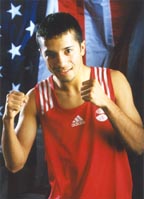 Southpaw Jose Navarro won the Junior Olympics in 1996 and 1997 at
90 and 100 pounds respectively. He won a silver at the 1998
U.S. Championships. Navarro was defeated by Robert Benitez in the
1999 National Golden Gloves and by Jose Aguiniga in the 1999 PAL
Championships. Navarro defeated Benitez in the 1999 U.S.
Challenge before losing to John Medina in the finals. He won
a silver at the 1999 Pan American Games. Although Navarro
lost to Benitez at the 2000 U.S. Championships, he defeated
Benitez when it counted in both the Olympic Trials (26-21) and
Olympic Box Offs (10-4).
Southpaw Jose Navarro won the Junior Olympics in 1996 and 1997 at
90 and 100 pounds respectively. He won a silver at the 1998
U.S. Championships. Navarro was defeated by Robert Benitez in the
1999 National Golden Gloves and by Jose Aguiniga in the 1999 PAL
Championships. Navarro defeated Benitez in the 1999 U.S.
Challenge before losing to John Medina in the finals. He won
a silver at the 1999 Pan American Games. Although Navarro
lost to Benitez at the 2000 U.S. Championships, he defeated
Benitez when it counted in both the Olympic Trials (26-21) and
Olympic Box Offs (10-4).
The positive: Navarro is a scrappy southpaw who throws many
punches, has a good chin, and is at his best when he uses a bit of
footwork.
The negative: Navarro is hit too easily and, although solid, is
not a great puncher.
Pro Prospects: A good trainer and intelligent management will be
very
important to Navarro because of his current weaknesses. At
only 19, he is young and has time to develop into a good pro.
Jose's brother Carlos won U.S. national titles in 1994 at 112
pounds and 1995 at 119 pounds, but lost to Floyd Mayweather, Jr.
in an attempt to make the Olympic team at 125 pounds.
Carlos's professional career has moved slowly and he recently
suffered a loss.
119 pounds
Clarence Vinson
Washington, D.C.
Age: 22
Height: 5'2"
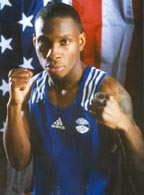 Clarence Vinson won the 1997 and 1998 U.S. Championships at 112
pounds. Vinson lost in the second round of the 1997 World
Championships. Gerald Tucker defeated Vinson (3-2) in the
1999 National Golden Gloves at 119 pounds, but Vinson avenged the
defeat to Tucker in the finals of the 1999 U.S. Challenge [10-10
(47-39)]. He defeated Antonio Rodriguez (11-8) to win the
1999 U.S. Championships. Vinson was defeated in the
quarterfinals of the 1999 World Championships by Zakhid Mekhtiyev
of Belarus (7-4). He secured his position on the Olympic
team by defeating Aaron Garcia in both the Olympic Trials (12-4)
and Box-Offs (9-4).
Clarence Vinson won the 1997 and 1998 U.S. Championships at 112
pounds. Vinson lost in the second round of the 1997 World
Championships. Gerald Tucker defeated Vinson (3-2) in the
1999 National Golden Gloves at 119 pounds, but Vinson avenged the
defeat to Tucker in the finals of the 1999 U.S. Challenge [10-10
(47-39)]. He defeated Antonio Rodriguez (11-8) to win the
1999 U.S. Championships. Vinson was defeated in the
quarterfinals of the 1999 World Championships by Zakhid Mekhtiyev
of Belarus (7-4). He secured his position on the Olympic
team by defeating Aaron Garcia in both the Olympic Trials (12-4)
and Box-Offs (9-4).
The positive: Vinson is lightning fast a la Floyd Mayweather, Jr.
The negative: His punches are so fast the judges may not see them.
He is not physically imposing and his height is a disadvantage.
His style may be better suited for the professional ranks.
Pro Prospects: His style and blazing speed make him an attractive
prospect, but his height and strength deficiencies may limit his
growth. However, he is in an interesting weight range right
now, and, speed kills.
125 pounds
Ricardo Juarez
Houston, Texas
Age: 20
Height: 5'3"
Ricardo "Rocky" Juarez also burst on the scene as a
youngster, winning the 1996 Junior Olympics and 1997 U.S. Under 19
Championships both at 119 pounds. In the 1997 World
Championships, Juarez lost in his first round bout to George
Olteanu of Romania. Olteanu won the 1999 world title at 119
pounds. Juarez defeated Tiger Allen and Aaron Torres to win
the 1999 U.S. Challenge at 125 pounds, and Steven Luevano to win
the 1999 U.S. Championships. Juarez won the 1999 World
Championships at 125 pounds by defeating Tulkunbay Turunov of
Uzbekistan. At the 2000 U.S. Championships, he defeated
Michael Evans and Teaunce Shepherd. Juarez again defeated
Shepherd at the Olympic Trials and Steven Luevano in the Finals
(17-7). At the Box Offs, he again defeated Luevano in a much
closer match (11-8).
The positive: Juarez is experienced at the international level,
and is a hard puncher with a good chin and decent defense.
The negative: Juarez may have trouble with boxer/punchers and
slick southpaw types.
Pro Prospects: His strength makes him a very good pro prospect,
especially at featherweight, which is one of boxing's most
exciting divisions right now.
132 pounds
David Jackson
Seattle, Washington
Age: 24
Height: 5'8"
Originally, the 132 pound Olympic representative was Marshall
Martinez, but Martinez left the team for personal reasons and
turned professional. Jackson, the alternate, took Martinez's
place. David Jackson was an alternate at the 1996 Olympic
Games and won his only national title in 1997. He defeated Sergio
de la Torre in the 2000 Western Trials Finals. At the
Olympic Trials, Jackson was defeated by Marshall Martinez (23-7),
then stopped Jacob Hudson in order to again challenge Martinez in
the Box Offs, which he lost (18-4).
The positive: It is not unprecedented for alternates to do well in
the
Olympics. Just ask Joe Frazier, who had lost to Buster
Mathis but won a gold after injury forced Mathis to forgo the
Olympics. Jackson is a relatively tall lightweight and has
stayed with the amateurs for quite some time.
The negative: He was not close to being as good as the much
stronger
Martinez.
Pro Prospects: His prospects are not all that great because he is
only a slightly above average fighter. Strong management will be
necessary.
139 pounds
Ricardo Williams, Jr.
Cincinnati, Ohio
Age: 19
Height: 5'8"
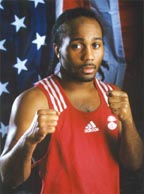 Southpaw Ricardo Williams, Jr. was a 1996 and 1997 Junior Olympic
champion at 125 and 132 pounds respectively. In 1998, he won
the U.S. Championships, National Golden Gloves, and the Goodwill
Games at 139 pounds. Williams, Jr. defeated Ebo Elder in
both the 1999 U.S. Challenge and 1999 U.S. Championships. He
lost his second round bout at the 1999 World Championships.
Williams, Jr. defeated Jose Celaya at both the Olympic Trials
(13-3) and Box Offs (15-6).
Southpaw Ricardo Williams, Jr. was a 1996 and 1997 Junior Olympic
champion at 125 and 132 pounds respectively. In 1998, he won
the U.S. Championships, National Golden Gloves, and the Goodwill
Games at 139 pounds. Williams, Jr. defeated Ebo Elder in
both the 1999 U.S. Challenge and 1999 U.S. Championships. He
lost his second round bout at the 1999 World Championships.
Williams, Jr. defeated Jose Celaya at both the Olympic Trials
(13-3) and Box Offs (15-6).
The positive: Williams, Jr. is a slick southpaw with excellent
defense, counterpunching, and decent power. A Whitaker/Judah type.
The negative: He is too defensive and does not throw enough
punches.
Pro Prospects: Although not an exciting fighter, his speed, skill
and
southpaw style make him an excellent pro prospect who cannot be
ignored.
147 pounds
Dante Craig
Cincinnati, Ohio
Age: 22
Height: 6'
Craig was a 1994 Junior Olympic champion at 132 pounds. He
won the 1999 National Golden Gloves by defeating LeChaunce
Shepherd. He defeated Kelly Pavlik, Ebo Elder, LeChaunce
Shepherd, James Webb, and Ramon Olivas to win the 1999 PAL
championships. At the Olympic Trials, he again defeated
Shepherd and Olivas, but lost in the finals to Larry Mosley
(15-5). He defeated James Webb to get to the Box Offs, where
he twice upset the favored Mosley in very close bouts [8-7 and 9-9
(49-46)] to obtain a berth on the Olympic team.
The positive: Craig is tall and fairly strong, with a decent chin
given his
height.
The negative: He is susceptible to being outboxed and is not
special in any one area.
Pro Prospects: Craig is in the right weight division but is not a
super
talent, a la Vernon Forrest. The training and management he
receives will have a big impact.
156 pounds
Jermain Taylor
Little Rock, Arkansas
Age: 22
Height: 6'
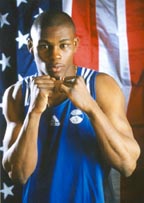 Taylor won the 1996 U.S. Under 19 championships at 156 pounds.
He lost a controversial decision to Cleveland Corder in the 1997
National Golden Gloves finals. Taylor won the 1998 National
Golden Gloves, and won a bronze medal at the 1998 Goodwill Games.
Taylor defeated Anthony Hanshaw to win the 1999 National Golden
Gloves. He was the 2000 Eastern Trials Champion, retiring
Julian Townsend. In the Olympic Trials, Taylor defeated
Kelly Pavlik, Anthony Hanshaw, and Sergio Mora (12-3) in the
finals. In the Box Offs, Taylor dominated Anthony Hanshaw
(20-2).
Taylor won the 1996 U.S. Under 19 championships at 156 pounds.
He lost a controversial decision to Cleveland Corder in the 1997
National Golden Gloves finals. Taylor won the 1998 National
Golden Gloves, and won a bronze medal at the 1998 Goodwill Games.
Taylor defeated Anthony Hanshaw to win the 1999 National Golden
Gloves. He was the 2000 Eastern Trials Champion, retiring
Julian Townsend. In the Olympic Trials, Taylor defeated
Kelly Pavlik, Anthony Hanshaw, and Sergio Mora (12-3) in the
finals. In the Box Offs, Taylor dominated Anthony Hanshaw
(20-2).
The positive: Taylor is one of the strongest members of the
Olympic team and his punches will score.
The negative: He does not throw enough punches which leaves him
susceptible to being outboxed, and he can be a bit wild.
Pro Prospects: His strength and power make him an excellent pro
prospect, and he is in the right weight division.
165 pounds
Jeff Lacy
St. Petersburg, Florida
Age: 23
Height: 5'11"
Jeff Lacy lost in the 1996 semifinals of the Eastern Olympic
Trials. He
lost his first round bout at the 1997 World Championships (13-8)
to
Uzbekistan's Dilshod Yarbekov. Lacy won the U.S.
Championships at 165 pounds in 1998. He lost to Romaro
Johnson in the 1999 National Golden Gloves and Jerson Ravelo in
the 1999 U.S. Challenge. He also lost to Arthur Palac in the
finals of the 1999 U.S. Championships. Lacy defeated
William Gibbs to win the 1999 PAL Championships. At the
Olympic Trials, Lacy defeated Ravelo as well as Randy Griffin
(26-10) in two wars, becoming the trials champion. Arthur
Palac defeated Lacy in their first Olympic Box Offs bout (12-9).
Palac was required to defeat Lacy twice to win a berth on the
team. Lacy won the rematch with Palac in a close and
controversial decision (10-9).
The positive: Lacy has very good power, speed, and chin a la
Holyfield.
The negative: Palac showed he is vulnerable to slick boxers, and
his
performances have been inconsistent.
Pro Prospects: His speed and power make him an excellent pro
prospect, especially if he keeps his weight down.
178 pounds
Olanda Anderson
Fort Carson, Colorado/Army
Age: 28
Height: 6'2"
Like David Jackson, Olanda Anderson was not the originally named
U.S. Olympian. In 1996, Anderson lost to Anthony Stewart in
the Olympic Trials challengers bracket 178 pound final.
Anderson won the 1998 U.S. Championships at 178 pounds. He
won the 1999 PAL Championships by defeating Michael Simms, Jr. and
DeAndrey Abron. Anderson again defeated Simms, Jr. to win
the 2000 U.S. Championships as well. He won the Olympic
Trials, defeating Abron and Felix Cora. However, he was
twice defeated in the Box Offs by Michael Simms, Jr. [(12-5) and
(11-7)]. When Simms, Jr. was dismissed from the team for
conduct violations, Anderson became the U.S. representative.
The positive: Simms,Jr. was the world champion and Anderson had
twice defeated him prior to the Box Offs. Anderson appears
to be fairly strong.
The negative: Anderson can be outworked and outboxed, even by a
fighter like Simms, Jr., who did not appear to be very strong.
Pro Prospects: He is a solid guy but is too old and not exciting
enough.
201 pounds
Michael Bennett
Chicago, Illinois
Age: 29
Height: 6'
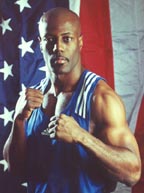 Michael Bennett lost to Malik Scott in the 1999 U.S. Championships
finals. Bennett defeated Terry Owens to advance to the finals of
the 1999 National Golden Gloves, but was stopped in the second
round by hard punching Davarryl Williamson. Bennett defeated
Jason Estrada and Mike Kirkman to win the 1999 U.S. Challenge.
He won the 1999 World Championships when the Cuban team forfeited
to protest the decisions which were being rendered. He
defeated Devin Vargas, Anthony Stewart, and Estrada to win the
2000 U.S. Championships. At the Olympic Trials, Bennett
again met Davarryl Williamson, but this time overcame Williamson's
power by intelligently outboxing him (18-5) even after being hurt.
At the Box Offs, he also avenged his loss to Malik Scott (3-0) to
secure his position on the team.
Michael Bennett lost to Malik Scott in the 1999 U.S. Championships
finals. Bennett defeated Terry Owens to advance to the finals of
the 1999 National Golden Gloves, but was stopped in the second
round by hard punching Davarryl Williamson. Bennett defeated
Jason Estrada and Mike Kirkman to win the 1999 U.S. Challenge.
He won the 1999 World Championships when the Cuban team forfeited
to protest the decisions which were being rendered. He
defeated Devin Vargas, Anthony Stewart, and Estrada to win the
2000 U.S. Championships. At the Olympic Trials, Bennett
again met Davarryl Williamson, but this time overcame Williamson's
power by intelligently outboxing him (18-5) even after being hurt.
At the Box Offs, he also avenged his loss to Malik Scott (3-0) to
secure his position on the team.
The positive: Bennett has good footwork and conditioning for a
heavyweight and also has a decent punch and ability to adapt.
His international experience will serve him well.
The negative: Bennett does not have a good enough chin to
withstand Felix Savon's power.
Pro Prospects: He is not strong enough, is too old, and does not
have a good enough chin to make a dent in the heavyweight
division.
201+
Calvin Brock
Charlotte, North Carolina
Age: 25
Height: 6'2"
Weight: 222 pounds
Calvin Brock won the U.S. Under 19 Championships at 201 pounds in
1993. He advanced to the semifinals of the 1996 Olympic
Trials champions bracket at 201 pounds before losing to eventual
representative Nate Jones. Brock was a runner up in the 1997
and 1998 U.S. Championships. He defeated Dominick Guinn to
win the 1999 U.S. Challenge and T.J. Wilson to win the 1999 U.S.
Championships. At the Olympic Trials, he again defeated
Guinn (6-5) and Wilson (4-0). Brock lost his first Box Offs
bout with T.J. Wilson (1-0), but managed to barely defeat Wilson
(6-5) in the second bout.
The positive: Brock is deceptively strong and has managed to limit
his opponents' scoring. The negative: He does not work enough, can
be outboxed, and is not special in any one area.
Pro Prospects: Brock's style is dull and he's not good enough to
be a
champion, but given the poor state of the heavyweight division, he
may do fairly well if carefully managed.
Back
To WAIL! Contents Page
|
|
|
|
|
|
|
|
|